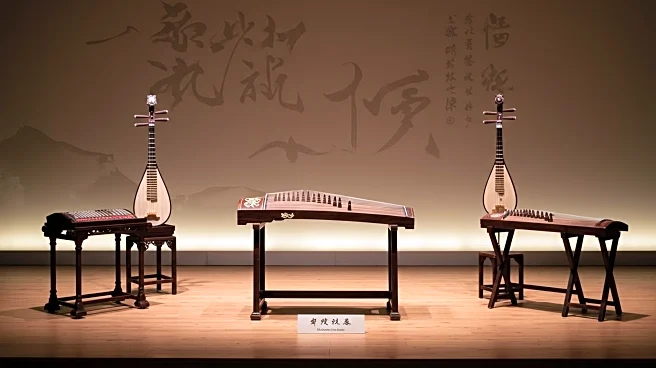What is the story about?
What's Happening?
The Cambridge Chinese Music and Culture Festival, organized by Shi Yang Mortimer, is celebrating its second year in Cambridge, UK. The festival features traditional Chinese music played on instruments such as the guqin, guzheng, and pipa, alongside Western instruments. More than 20 performers from around the world are participating in a series of concerts, dragon dances, calligraphy workshops, and tea ceremonies. The event is organized by the Cambridge Chinese Community Centre, the Cambridge Qin Society, and the Cambridge University Chinese Orchestra Society. The festival aims to serve as a cultural bridge between East and West, offering a platform for cultural exchange and understanding.
Why It's Important?
The festival highlights the importance of cultural exchange in fostering understanding and appreciation between different communities. By bringing traditional Chinese music to a Western audience, the event promotes diversity and inclusivity. It also provides an opportunity for attendees to experience and learn about Chinese culture, which can lead to greater cultural awareness and acceptance. The festival's success could encourage similar events, further promoting cultural diversity and dialogue in multicultural societies.
What's Next?
The festival will continue with various events, including the Chinese Music and Culture Day at Storey's Field Centre in Eddington. Attendees can expect demonstrations of traditional Chinese painting, paper-cutting, and tea ceremonies. The organizers hope to expand the festival in future years, potentially increasing its reach and impact. The success of this year's festival could lead to more collaborations between cultural organizations, enhancing the cultural landscape in Cambridge and beyond.
Beyond the Headlines
The festival's emphasis on cultural exchange raises questions about the role of arts and culture in diplomacy and international relations. By showcasing traditional Chinese music in a Western context, the festival challenges stereotypes and encourages a more nuanced understanding of Chinese culture. This approach can contribute to breaking down cultural barriers and fostering global cooperation.















